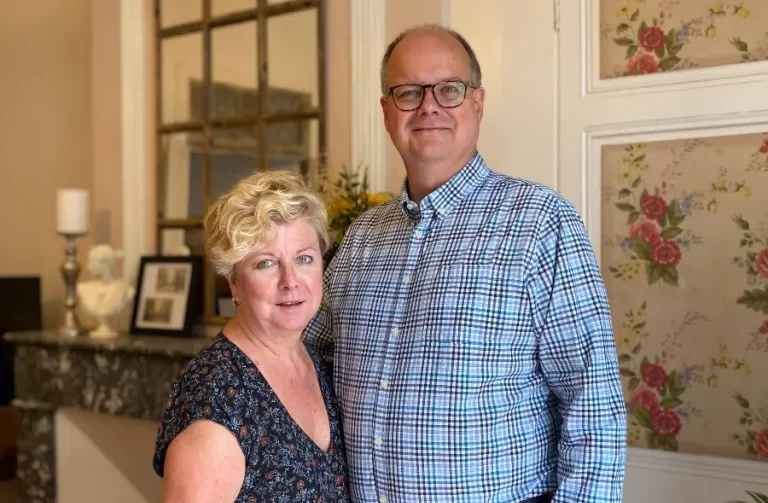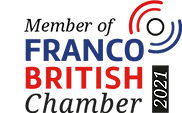
American couple Gordon and Deb have been French Connections HCB clients for a few years now, ever since we helped them find and renovate their house and sort out their French visas. They offered to share their experience of living in France with others who might be thinking of making the move.
When people move to France, they are often asked to describe the lifestyle. What is it like being here? How does life in France compare to life in the US? Gordon and Deb are no strangers to the question and immediately cite three things: pace of life, quality of produce and the cost of living.
“Life is slower in France and we appreciate that. We love being able to take our time to go to the market, like we did this morning, and buy a lot of wonderful fruits, vegetables, meats….”
Provenance is also important to them.
“Everything’s labeled with its place of origin – Spain, France or more locally – so you know where your food is coming from. We feel good about that. Last summer, we were at the butcher’s and we bought some steaks. What suddenly struck me was the wonderful quality of food. All the meat in the butcher’s shop is very local to our area, Mirande. The Mirandaise cows that you saw out in the field two days earlier are now in the butcher’s shop. The beef is excellent quality and costs roughly the same per kilo as we would pay per pound back home. That got us thinking back to what we’re used to paying in the US and we started keeping track.”
Is everything cheaper in France?
“When we look at what we term as daily costs – fruit, vegetables, meat, going out to dinner, wine and drinks, whatever it may be – living in France works out to be about 60% of the cost of living in Minnesota. Of course, French cheese bought in France is always going to cost less here than it costs in the US, same with French wine. But as a general rule, day to day living costs about 40% less.”
Is there anything that’s more expensive here?
” The only ongoing outlay that’s more expensive is gasoline, no doubt about it. Right now, it’s a little less than €2.00 per litre, which when you have converted euros to dollars and then litres to gallons, it works out to be roughly US $8 a gallon, which is a lot more than the $2.50 – $3 we would be paying in the US.”
However, Gordon is quick to explain that the cost of gas is only one part of the equation.
“There are a couple of things to consider. Firstly, cars in France are much smaller and much more fuel efficient than many of the cars in the US. And secondly, the distances are closer. Most of the places we drive to are within the Gers region where we live, arguably an hour at most in any direction. So instead of driving hundreds of miles, we’re driving a few tens of kilometres and in vehicles that aren’t as thirsty.”
Eating out is a very different experience, too.
“A tip is not expected, because it is usually included. It’s not that the servers aren’t getting paid; in fact, they’re getting paid better than they do in the US. But it’s not variable. They know what to expect. Food service is considered a profession here and not just a transition to something else as it often is in the US. The whole tipping system in the US is probably a topic for another day, but the fact that the tax and any staff gratuity already is already built into the price you see on the menu translates to a much lower cost in France. To give you a concrete example, it’s not uncommon if we go out to dinner at a nice restaurant in the US to pay between US$200 – $250 with everything included (tax and tip) for the two of us. Here in France, even if we’ve eaten at the best restaurants in town, we’ve never topped €110, and that includes everything – dinner, a bottle of wine, a drink after dinner, probably also a drink before dinner. We’re not talking McDonald’s here. We’re talking about a lovely evening out for around US$100 for the two of us.”
Moving regularly between the US and France means Gordon and Deb have also learned how to manage fluctuating exchange rates.
“The trick is to get a good account. We use WISE. We keep money there in euros and we buy more whenever the price dips a little bit, just topping up as we use it. WISE also gives you a credit card, so it’s very easy. You can take money out at the post office or any bank so you don’t need to bother with a traditional French bank account. I thought we would have to open one but, basically, we found that there was no need for it. The WISE account is easy to set up. It’s online, you can add money from anywhere in the world and have multiple currencies.”
Of course, moving to a new country isn’t only about the cost of living. To settle happily, you also need to feel welcome. Deb is quick to reassure readers on that point.
“Nobody we have encountered has been unfriendly to us. I know we probably look a little different and so they know we’re not French. It’s pretty evident. But everyone’s been very kind and welcoming and easy to talk with. We have made some very good friends here. Our French is OK. It’s not great and we know that. At a market recently, I asked for some cheese in French. The woman responded in English because we clearly weren’t native French speakers and she spoke English and it was easier for her and I’m fine with that. We continued the exchange in a mixture of English and French (or Franglais as we call it!). I realized at that moment that we can be here, we can have a marvelous experience and we don’t have to know it all. We don’t need to be able to discuss philosophy in French. It’s polite to know some words. It’s polite to make an effort. But most people here speak some English. If you’re willing to make a bit of an effort, people will meet you halfway.”
Gordon and Deb are often asked if they were initially worried about making the move to France. Did they have any doubts?
“Honestly, we weren’t sure how we would work out, two people dropping into this little town of 3500 people where everybody has known each other for their entire lives. But it has been nothing but fantastic. The minute we leave, we look forward to coming back again because everyone is so welcoming. I walk to the bakery every morning and I see Didier who runs the leather goods store, and I wave to him. And I see people at the little bar and I wave to them. People recognize us now and we feel like we’re part of the community.”
Choosing where to live plays an important part in settling in. In Gordon and Deb’s case, they opted for a townhouse in a small town. Do they ever regret that decision?
“No, no, that’s exactly what we wanted! We wanted a place in a smaller town because we would be able to get to know more people. We didn’t want to be in a city. And we chose a townhouse because we didn’t want to have to worry about upkeep of a property outside the town. Living in town, we can walk to the bakery and buy fresh croissants and baguettes every morning. That’s important to us. There are beautiful houses not far out of town, but you couldn’t just walk to the bakery. And many of the roads aren’t made for people walking along the sides! When we go out to dinner, it’s maybe a 6 or 7 minute walk to the furthest point in our little town. Our car sits idle for most of the week because we can walk wherever we want to go and we love that!”
There is also a more practical consideration.
“Right now, our lifestyle is part time here, part time in the US. If we had a big farmhouse with lots of land and a pool and all those things, we’d have to hire someone to take care of the house in France, whereas now we can basically lock the door and not worry about it.”
How did Gordon and Deb’s American friends take the news that they were moving to France?
“We have a group of very close friends that we’ve known for many, many years. When we told them we were buying a house, one of them said they thought only movie stars and rich people had houses in the South of France! The thing is, it’s so easily doable. It takes planning, of course, and it’s not something you do on a whim. But frankly it’s a lot less expensive to buy a house and live here than most people think. Maybe it’s different in Paris, but not in a small town in the South. In terms of actual running costs of the house, the electricity is about $100 a month and we’re all electric with no gas. That’s maybe 1/3 of what we pay in the US to heat and cool our place. Taxes are less and our cell phone is also substantially less than we pay in the US. In Minnesota where we live, everyone wants a cabin on a lake in northern Minnesota. We would have spent three times what we spent on our house in France to get that, plus all the upkeep of being on a lake and in a harsher climate.”
For Gordon and Deb, the adventure is only just beginning.
“In France, there are always new things to discover and that’s what makes it so fun. If we go down to the Basque country, for example, there are different foods, different fabrics, different designs, everything looks different. Being here is wonderful, we’re not far from the ocean and not far from the mountains either, but we also have the opportunity to see other parts of France and even other parts of Europe. Almost anywhere you are in France, you only need to drive 50 – 75 miles in any direction, and you are in a different world. Maybe people speak with a different accent. Maybe you have different food. You taste different wines because they grow different grapes in that particular area. The architecture, the houses, even the pastries…By simply driving an hour or two, it’s like you’re in a different land.”
At French Connections HCB, our friendly bilingual team helps English-speaking people from all over the world settle in France. If you would like to chat with us about your plans, whether they’re advanced or just beginning, a good place to start is a 30-minute initial consultation which you can book online here. It’s your chance to ask questions and get some sound advice, one to one. The consultation costs 90 euros but this is deducted from any of our services that you might book later.
Meanwhile, if you’d like to know more about Gordon and Deb’s French adventure, you can enjoy all six episodes of their French house renovations and an interview here.


